- Home
- Joel C. Rosenberg
Damascus Countdown Page 16
Damascus Countdown Read online
Page 16
Marseille pressed 2, then entered Murray, Thomas. A moment later, to her surprise, she was talking to the executive assistant to the deputy director for operations.
“Hi, Ellen, this is Marseille Harper. I’m sorry to call so late at night, but I have an urgent favor I need to ask of Mr. Murray.”
KARAJ, IRAN
“Hello?”
“Oh, thank God!” David said at the sound of the old man’s voice, stunned that he had actually, finally gotten through to him. “How are you? Are you okay?”
“I’m sorry; who’s this?” Birjandi asked, his voice tinged with suspicion.
“Dr. Birjandi, it’s me, Reza Tabrizi—David Shirazi—who do you think?”
“Oh, yes—how good to hear your voice, my friend!”
“And yours as well. How are you? Are you okay?”
“Yes, yes, of course.”
“The war hasn’t affected you?”
“It’s affected all of us, I’m afraid,” Birjandi replied. “But I’m fine. Thank you for asking.”
“Do you have enough food?”
“Oh yes.”
“What about power?”
“From the Lord, yes. From the electric company, no. But I have gas to cook with, so we’re making tea.”
David tensed. “We who?”
“Two from my little discipleship group,” Birjandi explained. “You recall, you met them the last time you were here.”
“Right,” David said. “But I’m surprised you’re meeting now, under these circumstances.”
“Me too,” Birjandi said. “They just showed up a short while ago. They wanted to study the Scriptures, so we’re having a Bible study. There’s not much else to do, but what could be more important? Indeed, I wish you were with us.”
“So do I,” David said. “So you’re really safe? You’re okay? You have everything you need?”
“The Lord is my Shepherd, David. I shall not want.”
“I’m so glad. I’ve been trying to reach you for days. Why haven’t you been answering your phone?”
Birjandi apologized for not answering, though he didn’t really offer an explanation. Rather, he asked about David and how he was doing.
“I’m safe,” David replied. “I’m well. How does the song go? ‘I get by with a little help from my friends.’”
Birjandi didn’t say a word, and David figured he probably wasn’t much of a Beatles fan anyway.
“Anyway, listen,” he continued, “there’s so much I want to talk to you about. I have a lot of questions. But there’s a specific reason I’ve been trying so hard to get ahold of you, Dr. Birjandi. Can I start with that?”
“Yes, certainly, my son. Whatever you need.”
“Dr. Birjandi, we have a serious problem, and we need your help.”
“Yes, I’ve heard.”
“Really? What do you know?”
“That the Iranians have hit the Dimona reactor, and that the prime minister is considering nuclear retaliatory strikes.”
David’s heart raced. “I thought you had no electricity.”
“I don’t,” Birjandi said.
“Then you don’t have radio or television?”
“No.”
“Did you hear this from Hosseini or Darazi? What else did they say?”
“No, no,” Birjandi said. “I haven’t spoken to either of them. Nor do I want to. One of the young men here has a mobile phone that works. He’s getting Twitter messages from the West. From Najjar Malik, actually. That’s how we heard. But from your reaction, apparently it’s true.”
“Dimona was hit, yes.”
“And are the Israelis going to fire nuclear weapons at us?”
“I don’t know, Dr. Birjandi. I really don’t.”
“But it’s possible.”
“Yes, I’m afraid it is.”
“Just possible? Or probable?”
David hesitated. He didn’t want to worry his friend or the man’s students. But Birjandi had always shot straight with him. David figured the man deserved the same. “Honestly, I think it depends in large part on how much damage was done to the reactor at Dimona. If the reactor was severely damaged and a radioactive cloud begins to spread across the State of Israel, that would put thousands of lives at risk, maybe millions. There are a lot of variables. But if I were a betting man . . .”
David paused, but Birjandi got it.
“It’s that bad?” the old man asked.
“Yeah, it is.”
“If the Israelis fired nuclear missiles, they would certainly hit Tehran, right?”
“That I don’t know.”
“Bushehr?”
“Probably.”
“Natanz?”
“Probably.”
“Qom?”
“Maybe.”
“Hamadan?”
“Almost certainly,” David conceded.
There was a long silence at the other end of the line. Finally David had to shift gears. “Listen, Dr. Birjandi, that’s not all. There’s another problem too. And it’s on this that I really need your help.”
“Yes, of course. What is it? How can I help?”
LANGLEY, VIRGINIA
Murray was on the line with the CIA station chief in Islamabad when his office intercom buzzed three times. That was his secretary’s signal that he had an important incoming call.
“Yes?”
“Mr. Murray, I’m sorry to bother you, but I thought you’d want to know Miss Harper has just called. She’s on line three. What do you want me to tell her?”
“Marseille Harper?” Murray asked, incredulous.
“Yes, sir.”
“It’s 3 a.m. Is she crazy?”
“Her best friend is in Israel and is staying at the hotel in Tiberias that collapsed. Her friend’s parents can’t get through to the embassy or the State Department to get any confirmation on whether their daughter and son-in-law are alive or dead. She said she took a chance that you were not only up but in the office, and she wondered if you could take a moment and talk to her.”
“No, I can’t,” Murray said. “I’m on the line with . . . I’m in the middle of . . . If I take this call now, I . . . Forget it. Never mind. Tell her I can’t come to the phone. But get all the information you need on her friends, get a number where you can call her back, and then get on the horn with our station chief in Tel Aviv and see what they know.”
KARAJ, IRAN
David explained the situation with the two missing Iranian warheads and the fear in Washington that one could be headed toward Israel and the other toward the U.S. homeland. He didn’t say how the CIA had learned of the warheads, but he did press Birjandi for intel.
“I haven’t heard anything about them.”
“Then I need you to call the Ayatollah.”
“What on earth for?”
“I need you to ask Hosseini for a meeting with the Twelfth Imam.”
“Absolutely not,” said the old man. “That’s out of the question.”
“Dr. Birjandi, look, I know it’s a lot to ask. But our only hope of finding those warheads is finding the Mahdi. He’s the only person we can be sure of who knows precisely where the warheads are. Maybe Hosseini knows, and maybe he doesn’t. Maybe Darazi knows; maybe not. But we can be certain the Mahdi knows where they are and is personally directing the strategy to use them against us and Israel. We need to find him, Dr. Birjandi. We need to know what he’s thinking, what he’s saying, what he’s doing. And right now you’re the only person who can reach out to him, ask for a meeting, and get one. The Mahdi has already indicated he wants to meet with you. You’ve been stalling. But you need to say yes, and you need to do it right now.”
“My friend, you are a good young man, and you are doing good work,” Birjandi replied, “but you’re asking something I cannot deliver.”
“With all due respect, my friend, you can; you’re just choosing not to,” David pushed back. “But you’re perfect for this. They love you. They trust you. They beli
eve you’re one of them. You can find out where the warheads are and what cities they’ll be used to attack, and you can call me on your satellite phone once you find out.”
“No; you’re not listening—that is out of the question.”
“But why?” David pressed. “Don’t you see how high the stakes are?”
“Of course I do,” Birjandi replied. “But I am not to see the Twelfth Imam under any circumstances. Don’t you understand?”
“No, honestly, I don’t. You’re the perfect mole. You’ve been summoned into the inner sanctum. And now you can say yes. You’re the answer to a lot of prayers, Dr. Birjandi. God has raised you up and prepared you for this very moment. Don’t you see?”
Birjandi’s exasperation was becoming evident in his voice. “Please listen carefully. Let me say it as clearly as I can. The Twelfth Imam claims to be the messiah, the Lord of the Age, right?”
“Right.”
“But he’s not the true Messiah, is he?”
“No.”
“So that makes him a false messiah, true?”
“True.”
“Okay, so we’re agreed. The Twelfth Imam is not just a false prophet. He’s not simply a false teacher. He is a false messiah. He may be possessed by Satan himself. His closest lieutenants—Ayatollah Hosseini and President Darazi—are evil men as well, deeply influenced by satanic powers. I don’t think they have always been, but I suspect they are now. And what do the Holy Scriptures tell us? In Matthew 24, the Lord Jesus made it very clear. ‘If anyone says to you, “Behold, here is the Messiah,” or “There He is,” do not believe him. For false messiahs and false prophets will arise and will show great signs and wonders, so as to mislead, if possible, even the elect. Behold, I have told you in advance. So if they say to you, “Behold, He is in the wilderness,” do not go out, or, “Behold, He is in the inner rooms,” do not believe them.’ Now you may not understand any of this because you refuse to take the lost condition of your soul seriously. But I gave my life to the Lord Jesus because he gave his life for me. And if he tells me not to go out to meet with false messiahs, then I am going to obey him—no matter how much it costs me or how much it displeases you.”
There was a long pause.
Then David said, “Well, Dr. Birjandi, I respect you a great deal. I really do. I disagree with you in this case, but I have the utmost respect for you, even love for you because of how much you have cared for my soul.”
“I want what is best for you, my son.”
“I know, and that’s why I need to tell you something.”
“What is that?”
“Well, it’s true that for most of my life, I refused to even think much about my soul, much less take care of it. But I want you to know, those days are gone.”
“What do you mean?” Birjandi asked. “What are you saying?”
“I’m saying the main reason I’ve been trying to get ahold of you for the past few days is not because of the war,” David explained. “The main reason is because the other night I got on my knees and repented of my sins and asked Jesus to save me.”
At that, Birjandi’s tone changed entirely. He laughed with evident joy, so loudly that David wondered what the man’s students must be thinking of this strange phone call they were probably overhearing.
“That is the best news I have heard in a long time, my friend. I’m so happy for you! Everything will be okay for you now. No matter what happens, nothing can separate you from the love of Christ! Bless you, my young friend! Now please, tell me everything. Tell me how it happened.”
And David did, grateful for Birjandi’s joy and excitement at his decision but hoping in the end he could still persuade his friend to say yes and arrange a meeting with the Mahdi.
It didn’t happen.
20
DAMASCUS, SYRIA
Hanna Nazeer was only twelve years old, but he had been looking forward to this moment since the age of seven. He could still remember the cold winter night five years before when he had knelt beside his bed with his mother and father and prayed to receive Jesus Christ as his Savior and Lord.
Hanna was not from a Muslim background. His parents were Orthodox Christians, as were all four of his grandparents before them, and all eight of his great-grandparents before them, and so forth going back at least two centuries. Still, Hanna insisted to his family and friends that he had not placed his faith in Christ simply because of his Christian heritage but rather because he truly believed. And now, to demonstrate that faith, he wanted to be baptized, just like the Lord Jesus was, just like Saint Paul was—indeed, perhaps in the very place where Saint Paul was baptized.
Hanna and his parents and his two younger sisters walked briskly through Bab Sharqi, the Eastern Gate, and soon arrived at the Chapel of Saint Ananias at the end of Straight Street in the Old City. They were a few minutes early, but there was already a small crowd. Amazed as he counted at least sixty people who had come for the ceremony, Hanna held his father’s big, calloused hand with his own left hand and held one of his sister’s small, smooth, dainty hands with his right as they squeezed through the mass of bodies to find the priest making final preparations at the front of the cavern-like stone sanctuary.
“Ah, finally, you are here,” exclaimed the priest. “Welcome, welcome. You have attracted a bit of attention here, Brother Hanna, haven’t you?”
Feeling shy amid all the attention and a bit warm and even claustrophobic with so many people crammed into so small a space, Hanna smiled awkwardly and looked down at the freshly swept stone floor. He hadn’t anticipated any of this. He’d never really thought about what would happen or how. All he knew was that he wanted to be baptized, and where better than the church built directly over the ancient home where Ananias was used by God to heal Saint Paul from the blindness he’d received upon seeing Jesus on the road to Damascus—the same house where Ananias had befriended and encouraged the Pharisee-turned-persecutor who would go on to be the greatest of the apostles?
HAMADAN, IRAN
“Do you realize, my friend, that you have now been adopted into God’s family?” Birjandi asked.
“Yes—it’s amazing,” David replied.
Birjandi hoped his young friend’s disappointment over his own lack of cooperation on intelligence matters would be mitigated by his enthusiasm over David’s decision to receive Christ. “But do you truly realize that you have been adopted by God himself?” Birjandi pressed. “That all your sins have been forgiven? Do you realize this?”
“I’m trying to, Dr. Birjandi,” David replied. “It’s still all so new to me.”
“I will pray for you, my son,” Birjandi said. “That’s all I can do for you now. I wish it were more. But this is my pledge—to pray without ceasing for you at this critical hour.”
David thanked him, and then the line went dead.
“That was a marvelous phone call!” Birjandi told the young men when he had hung up the satellite phone. “A dear friend has given his life to Christ.”
“Yes, we gathered as much,” Ali replied, smiling. “That’s so exciting, and we want to hear all the details. But first, we’re wondering: why was he trying to get you to go see the Mahdi?”
“That I cannot say, my friends,” Birjandi demurred.
“Why not?”
“I’m afraid that’s just between him and me.”
“But who is this friend, and what’s his interest in your going to see the Mahdi?” Ali asked. “Given your side of the conversation, he must have been quite adamant.”
“That is not for you to know,” Birjandi replied. “I don’t want you to speculate, and I would ask you not to repeat to anyone what you’ve just heard.”
Birjandi realized his cryptic answers were only making his disciples more curious, so he tried to get the conversation back on track. “Let us continue our study of the prophecies,” he said. “Open your Bibles to the book of Revelation. There is something I want to show you.”
“Wait a minute, wait a minute,�
�� Ibrahim said. “I respect you enormously, Dr. Birjandi. We both do. You know that. And we respect your privacy in certain matters, to be sure. So we won’t ask you any more about this friend who certainly seems to be working with—or for—a foreign government. A government that might be able to bring down the Mahdi and this evil regime that is leading our country to destruction. A government that perhaps the Lord wants to prophetically use to set into motion the liberation of the Persian people. Nevertheless, we won’t ask you about him, as incredibly eager as we are to understand how he might be able to help us. But still, I need you to clarify what you told this friend about meeting with the Twelfth Imam. You said he is a false messiah, correct?”
“Yes.”
“But the Mahdi is a man, a human being, flesh and blood, correct?”
“Yes, of course.”
“He’s not God.”
“No.”
“He’s a person, like you and me?”
“I suppose. In a manner of speaking. Why?”
“If you have access to him, shouldn’t you try to share the gospel with him? Shouldn’t you try to save him?”
“I cannot save anyone, my son. Only God can do that.”
“Yes, of course, but you know what I mean. Isn’t Muhammad Ibn Hasan Ibn Ali a soul worth sharing the Good News of Christ’s love and mercy and forgiveness with?”
“The man may be possessed by Lucifer himself,” Birjandi said.
“Maybe so,” said Ibrahim. “But didn’t Jesus cast demons out of lost souls and thereby win them to himself?”
“Of course.”
“And haven’t you been saying that Jesus chose us to share the gospel and to have authority in the spiritual battle to set people free from demonic oppression all over Iran? Shouldn’t you be doing the same?”

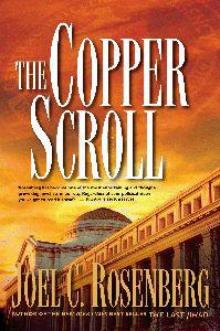 The Copper Scroll
The Copper Scroll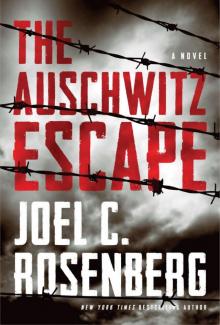 The Auschwitz Escape
The Auschwitz Escape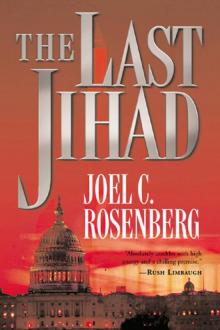 The Last Jihad
The Last Jihad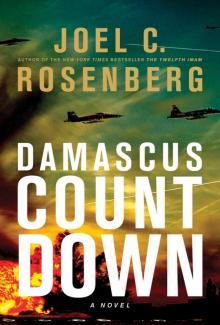 Damascus Countdown
Damascus Countdown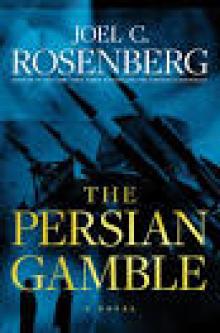 The Persian Gamble
The Persian Gamble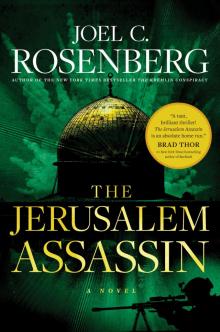 The Jerusalem Assassin
The Jerusalem Assassin Dead Heat
Dead Heat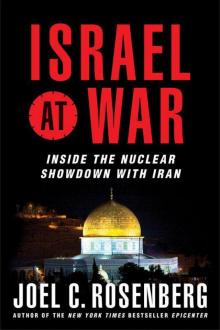 Israel at War: Inside the Nuclear Showdown With Iran
Israel at War: Inside the Nuclear Showdown With Iran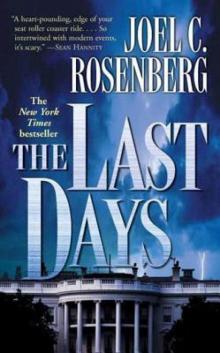 The Last Days
The Last Days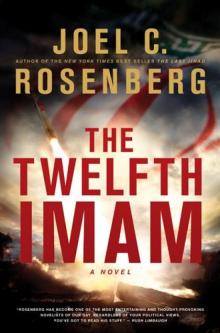 The Twelfth Imam
The Twelfth Imam Epicenter 2.0
Epicenter 2.0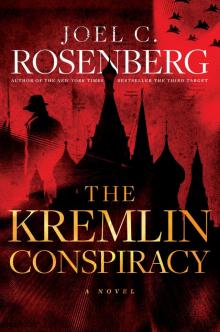 The Kremlin Conspiracy
The Kremlin Conspiracy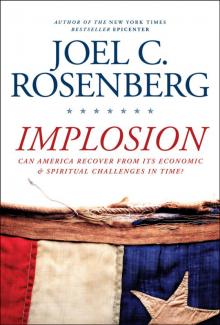 Implosion: Can America Recover From Its Economic and Spiritual Challenges in Time?
Implosion: Can America Recover From Its Economic and Spiritual Challenges in Time?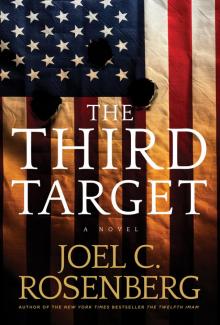 The Third Target: A J. B. Collins Novel
The Third Target: A J. B. Collins Novel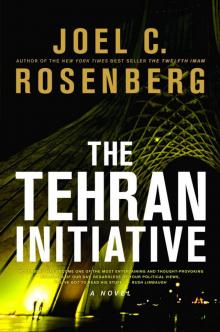 The Tehran Initiative
The Tehran Initiative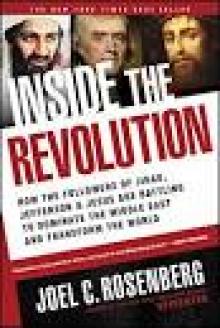 Inside the Revolution
Inside the Revolution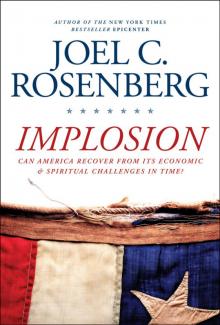 Implosion
Implosion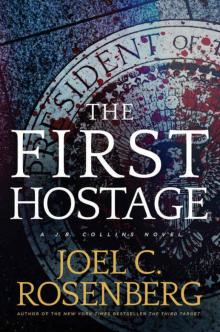 The First Hostage: A J. B. Collins Novel
The First Hostage: A J. B. Collins Novel